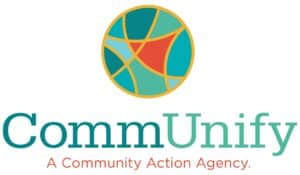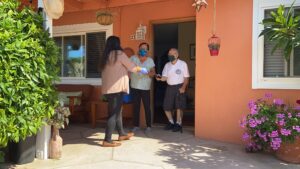SAM WATERSTONE | October 13, 2020
Perhaps no organization has been as integral to the coordination of health and human services during the COVID-19 pandemic as CommUnify (previously known as the Community Action Commission of Santa Barbara County). CommUnify has collaborated with a myriad of community partners, including the Santa Barbara County Office of Emergency Management (OEM) on COVID-19 relief and communication efforts; Family Service Agency, Dignity Health, AARP, Community Partners in Caring, C.A.R.E4Paws, and others to meet the needs of isolated seniors; with the Foodbank of Santa Barbara County to feed hungry children and families; and with many additional agencies as they coordinate essential services for those in crisis.

CommUnify was formed in 1964 to address the causes and conditions of poverty. More than 50 years later, the agency is now one of the largest nonprofits in Santa Barbara County and continues to work for our most vulnerable neighbors. The organization rebranded in September 2020 to better tell their story – a community action agency committed to “seeing our whole community come together in partnership to address inequalities.”
Employing nearly 400 staff members and operating more than 20 programs and services, CommUnify plays a critical role within Santa Barbara County’s social sector. Their programs focus on providing stability for working families and vulnerable populations, serving over 12,000 children, parents, and seniors throughout the county. CommUnify’s direct services include education and job training, rent and utility assistance, senior services, Santa Barbara County’s 2-1-1 Helpline, and much more.
Kemba Lawrence, CommUnify’s Community Services Director, oversees the Family Self-Sufficiency Program, an initiative designed to address barriers that prevent families from reaching self-sufficiency.
“In collaboration with our community partners, our goal is to assist families with reaching their goals of self-sufficiency – and we do that through areas such as education, addressing food and financial insecurities,” Lawrence explained. “We offer wraparound services and a comprehensive approach to case management and family services.”
Self-sufficiency is the goal, but during a pandemic, what most families need is a safety net. CommUnify was fortunate enough to receive federal CARES Act funding through the Utility Payment Assistance program, and was able to address some of their clients’ utility payment needs. For many families, however, utility costs are just one of several major expenses causing financial anxiety.

“Since COVID hit, what we’re seeing is that many people will be [at least] two or three months behind on their rent, and the only things saving them right now are the orders that have been put in place to prevent eviction – so what happens when those orders are modified or removed?” said Lawrence.
“A lot of our families need rental assistance. Funding for that program has been hit hard, so we’re concerned how that might result in homelessness. We’re anticipating an increase in that area as far as the next wave of issues.”
Due to the high cost of living in Santa Barbara County, many working families were living on the edge of poverty prior to the pandemic, one paycheck away from losing their housing or going hungry. Today the situation is even more dire. Agencies like CommUnify are focusing on collaborative solutions to support those facing crisis, and one promising approach is their 2-1-1 hotline.
CommUnify took over Santa Barbara County’s 2-1-1 Health & Human Services Helpline in 2014, and has since revamped the program in a variety of ways. Community members can now access the 2-1-1 line 24 hours a day, 365 days a year via phone, text messaging, or online. CommUnify has also partnered with the county’s Office of Emergency Management (OEM) to ensure that in the case of an emergency, information is disseminated quickly and accurately to as many residents as possible.
When the 1/9 Debris Flow struck our community in the first days of 2018, the 2-1-1 line was flooded with calls from concerned residents. Fortunately, CommUnify was prepared.

“We received thousands and thousands of calls overnight, and because we are part of the 2-1-1 California network, we were able to reach out to other call centers to support us, to take on these calls so we could seamlessly share what was happening with our community,” recalled Elisa Pardo, Program Manager for the Santa Barbara County 2-1-1 Health & Human Services Helpline.
“So naturally, when COVID-19 began affecting our community, people started calling 2-1-1 with questions about the stay at home order, how this will affect businesses, and inquiries about rent and utility assistance, mental health needs, and food, especially for seniors,” Pardo continued. “We had a 300% increase in our call volume during the first month of the pandemic – then it went up to 800% the following month.”
When people call 2-1-1 in need of support services or information, they are connected with a live call specialist who is able to navigate through the appropriate resources and provide the caller with information tailored to their specific needs. At the same time, these 2-1-1 calls give CommUnify and OEM a clear picture of exactly how the pandemic is impacting our community at any given time, allowing them to better understand the needs of our residents and ensure that information and resources are available to anyone in need.
“It is so important that our community stays connected, especially during these times. You can simply call us, text us, or visit our website and we are available year round, 24/7 to answer your questions and connect you to the resources you need,” emphasized Pardo.
“There are so many barriers that might exist for families,” Lawrence added, “and we’re here to provide the services to remove those barriers, or to activate existing partnerships that will address those barriers.”
The Santa Barbara Foundation awarded CommUnify with a COVID-19 Response Grant in April 2020.
Click here for a full list of COVID-19 Response Grant Recipients.
Beginning in April 2020, the Santa Barbara Foundation has highlighted a diverse set of nonprofits who have responded to the COVID-19 pandemic with remarkable agility, creativity, and selflessness. So many great organizations, including those who are fighting to stay afloat during this brutal moment in Santa Barbara County, have continued to prioritize the needs of the community above all else.
At the Foundation, we are inspired by the incredible projects and partnerships that have emerged in the face of this disaster.
Read about other nonprofits responding to the COVID-19 crisis.